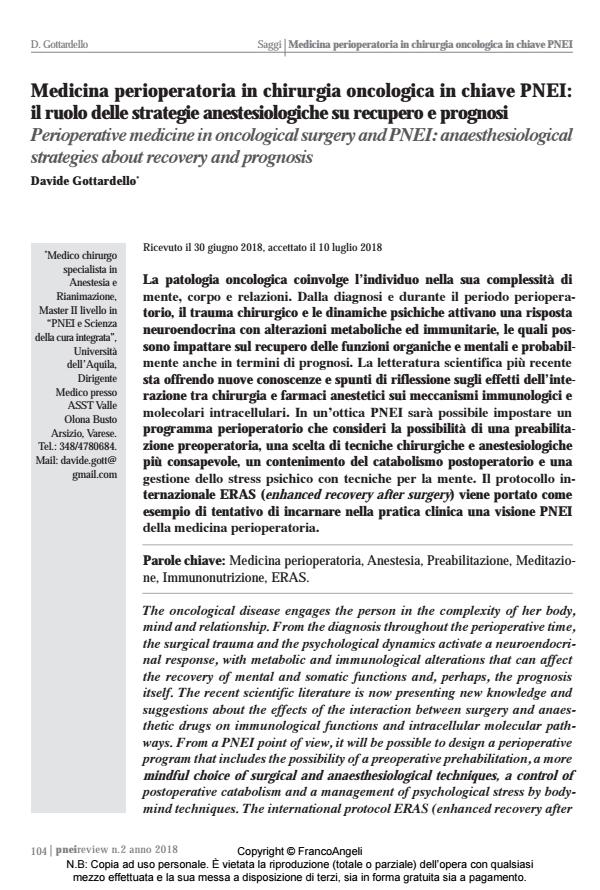Medicina perioperatoria in chirurgia oncologica in chiave PNEI: il ruolo delle strategie anestesiologiche su recupero e prognosi
Titolo Rivista PNEI REVIEW
Autori/Curatori Davide Gottardello
Anno di pubblicazione 2018 Fascicolo 2018/2
Lingua Italiano Numero pagine 13 P. 104-116 Dimensione file 1145 KB
DOI 10.3280/PNEI2018-002008
Il DOI è il codice a barre della proprietà intellettuale: per saperne di più
clicca qui
Qui sotto puoi vedere in anteprima la prima pagina di questo articolo.
Se questo articolo ti interessa, lo puoi acquistare (e scaricare in formato pdf) seguendo le facili indicazioni per acquistare il download credit. Acquista Download Credits per scaricare questo Articolo in formato PDF

FrancoAngeli è membro della Publishers International Linking Association, Inc (PILA), associazione indipendente e non profit per facilitare (attraverso i servizi tecnologici implementati da CrossRef.org) l’accesso degli studiosi ai contenuti digitali nelle pubblicazioni professionali e scientifiche.
La patologia oncologica coinvolge l’individuo nella sua complessità di mente, corpo e relazioni. Dalla diagnosi e durante il periodo perioperatorio, il trauma chirurgico e le dinamiche psichiche attivano una risposta neuroendocrina con alterazioni metaboliche ed immunitarie, le quali possono impattare sul recupero delle funzioni organiche e mentali e probabilmente anche in termini di prognosi. La letteratura scientifica più recente sta offrendo nuove conoscenze e spunti di riflessione sugli effetti dell’interazione tra chirurgia e farmaci anestetici sui meccanismi immunologici e molecolari intracellulari. In un’ottica PNEI sarà possibile impostare un programma perioperatorio che consideri la possibilità di una preabilitazione preoperatoria, una scelta di tecniche chirurgiche e anestesiologiche più consapevole, un contenimento del catabolismo postoperatorio e una gestione dello stress psichico con tecniche per la mente. Il protocollo internazionale ERAS (enhanced recovery after surgery) viene portato come esempio di tentativo di incarnare nella pratica clinica una visione PNEI della medicina perioperatoria.
Parole chiave:Medicina perioperatoria, Anestesia, Preabilitazione, Meditazione, Immunonutrizione, ERAS.
Davide Gottardello, Medicina perioperatoria in chirurgia oncologica in chiave PNEI: il ruolo delle strategie anestesiologiche su recupero e prognosi in "PNEI REVIEW" 2/2018, pp 104-116, DOI: 10.3280/PNEI2018-002008